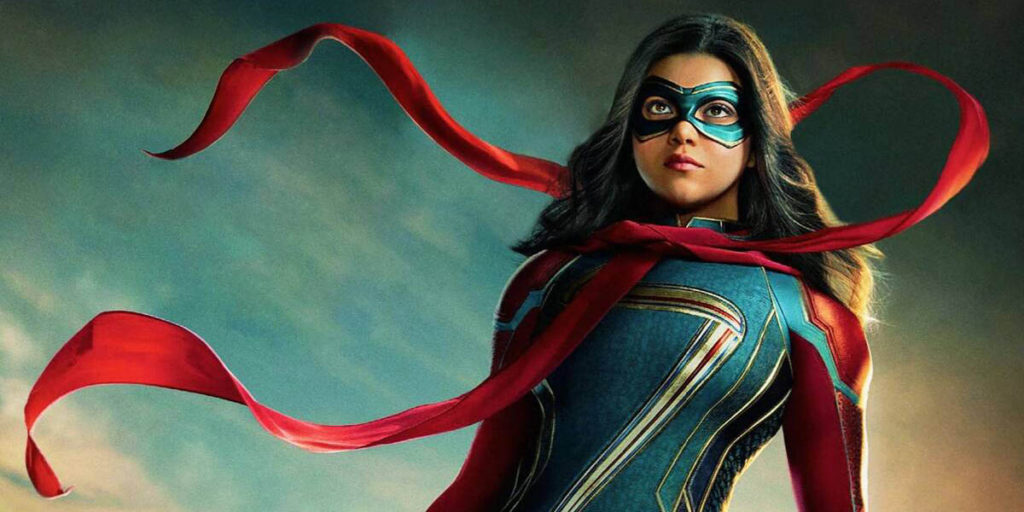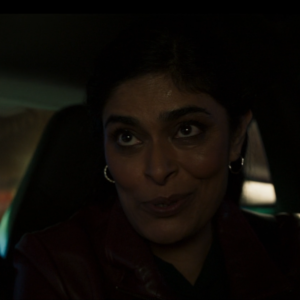
In the first episode of Ms. Marvel, the superhero fights a battle that is only too familiar to the Pakistani girls in her audience. The fight for parental permission. Kamala Khan wants to go to the first ever Avenger Con (not comic con since she lives in a world where the Avengers are very much real). Unsurprisingly, her parents are not on board with this idea. Mr. and Mrs. Khan are very against the idea of their daughter at a “party” with drugs, alcohol, and other “haraam” teenage shenanigans.
Kamala has yet to take on the Ms. Marvel moniker but is very much obsessed with her world’s superheroes, especially Carol Danvers aka Captain Marvel. While she fantasizes about super humans flying in the sky, Kamala herself must fight some rather unglamorous battles. She’s failed her driving test, is far from popular at high school, has to figure out her post-graduation plans and, well, there’s that Avenger Con her parents have refused to let her go to.

Kamala tries on her Captain Marvel costume for Avenger Con
When Marvel Studios announced that they were bringing a Muslim Pakistani to their cinematic universe, folks both at home and abroad celebrated it as a win for brown representation. However, a recently released teaser cast a pall over these celebrations. In it, Mrs. Khan tells Kamala she can go to the convention even though “there will be a lot of haraam going on there” but only if her father comes with her. Right on cue, Mr. Khan bursts through the door in a desi-Hulk costume, gleefully shouting “Chak de phatte”. It comes across as more of a caricature than sincere representation. This is rarely, if ever, how the word haraam is used colloquially and it’s unlikely that a father has ever burst through his daughter’s bedroom door saying “chak de phatte“.
However, ultimately Ms. Marvel is not about a Pakistani teenager at all, it’s about an American-Pakistani teenager. The cultural references in the show are meant to be representative of the diaspora, which is different from the native community in a lot of ways. Immigrant culture tends to be more diverse, incorporating elements from different South Asian communities, while also sometimes being more pronounced.
The first two episodes of Ms. Marvel do present moments where the viewer is left bemused at the Pakistani cultural representation. In the first scene we see Kamala’s brother Aamir (played by Saagar Shaikh), praying before he starts his breakfast. Hands held up in the air, Aamir seems to be involved in a protracted prayer. For most of us, however, a quick “bismillah” is usually enough. It’s not common to see a Pakistani Muslim indulge in a longer prayer before food.
Kamala’s father quips, “If you don’t stop praying long enough to put food in your mouth, one day you will starve to death,” and Aamir retaliates with, “May Allah forgive you one day.” While this is meant to be comical, it’s almost too comical, and not necessarily in the right ways. This is not a conversation that’s likely to happen in a Pakistani household, no matter how religious family members are, and it seems to be taking a jab at the religiosity of our culture. We see another instance of this, such as when Aamir walks into Kamala arguing with her parents and states, “Not a lot of salaam here, huh?”
Despite these over-the-top moments, there is something undoubtedly refreshing about seeing a superhero we can relate to in so many ways. The story arc of the first episode – Kamala attempting to go to Avenger Con on her own terms – is one that we’ve seen play out in our own homes. Arguing with her parents, Kamala brings her brother into it, “Now if it was him asking. Be like, ‘Oh, yes, Aamir. Do what you want Aamir beta.’” This hits home for Pakistani girls and women. We’ve grown up watching different rules being applied to our brothers than those reserved for us and at some point we’ve all felt frustrated at the unjustness of it.
Other aspects of Kamala’s life may not necessarily be relatable to Pakistanis at home but are pertinent to the diaspora experience. We get a look at Kamala’s mosque community, complete with gossiping aunties and uncles who run the mosque board. This is not a community of Pakistanis, but rather of Muslims from different ethnicities and cultures. On Eid, they gather for a festival, eating gyros and exchanging stories from back home. For diaspora Muslims mosques are more than places of worship, they are community centers and this aspect has been captured well in Ms. Marvel.
Ms. Marvel’s cast and crew also draw from talent of Pakistani origin. The shows head writer, Bisha K. Ali, is British-Pakistani, while two episodes are directed by our very own Sharmeen-Obaid Chinoy. The show is also peppered with actors from our own entertainment industry. In Episode 2, we see Samina Ahmed as Kamala’s Nani, having a conversation with her granddaughter over FaceTime. Nimra Bucha makes a brief appearance as Najma, who promises to be a major character in the show. It’s rumored that Mahwish Hayat will play Kamala’s outcasted great-grandmother Ayesha, with Fawad Khan as her great-grandfather.
However, Kamala’s parents are played by Indian actors. While it’s not ideal to cast two important Pakistani characters with actors who don’t hold the same origins, Zenobia Shroff and Mohan Kapur are doing a decent enough job in the roles.

Nimra Bucha makes a brief appearance at the end of Episode 2
Ms. Marvel’s defenders countered this criticism by pointing out that the show does sport multiple actors of Pakistani origin. This includes the homegrown talent of Nimra Bucha, Mahwish Hayat, Samina Ahmed, Fawad Khan, and Vardah Aziz.
Ultimately, Ms. Marvel does constitute a win for brown representation. This is the first time that we’ve seen an American superhero shopping for chooriyan, wearing a shalwar kameez, and listening to Punjabi music. That is no trifle for a film and television industry that has traditionally steeped Muslim representation in stereotypes of overgrown beards and angry religiosity.
It doesn’t hurt that the show is fun to watch. Paced well, it features strong performances and moments of humor that are enjoyable. Kamala is supported by characters that are easy to form an attachment to and the protagonist herself is lovable. The first two episodes have set up the story well, going slow with the exposition without being a drag.
Ms. Marvel’s success still hangs on how the next few episodes will unfold. While it’s an enjoyable watch, nothing has happened yet to get audiences hooked to the storyline. However, there’s a lot of potential with the way the narrative is currently unfolding. If nothing else, we may just keep coming back for the sounds and textures that make the show so relatable to us.





